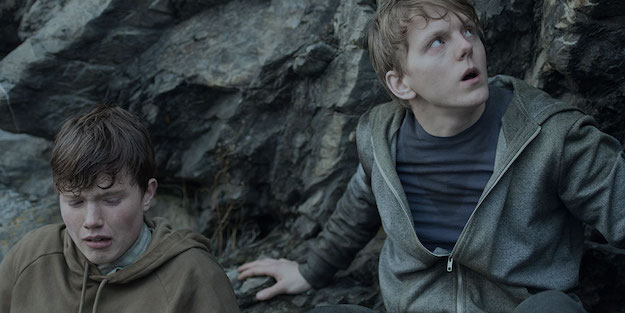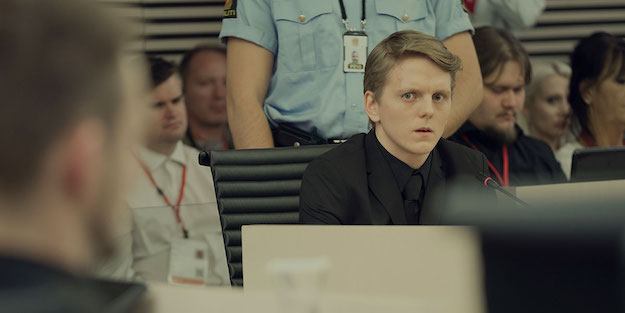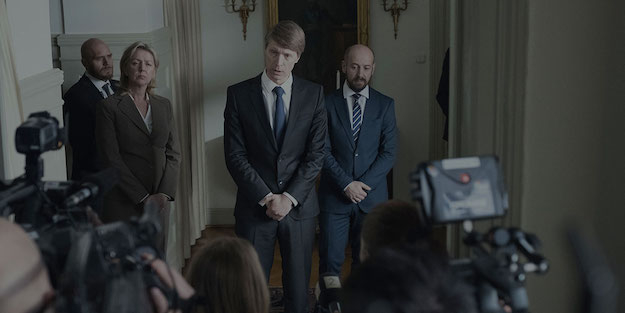Interview: Paul Greengrass
Over the past couple of months, seeing new films by Paul Greengrass, Mike Leigh, and Errol Morris, I have watched a certain tier of well-established filmmakers who have perfected different, highly distinctive solutions to framing reality and interpreting experience, now facing the potential of imbalance in their art. It’s not necessary to look far to find triggers—just read the news at virtually any moment of the day on your cellphone-turned-presidential-klaxon. Our current political and socioeconomic crisis seems to have produced an unignorable desire to address, with increasing explicitness, the high stakes in a chaotic world, as much out of personal frustration with the destruction and deterioration of democracy and civic discourse, as from a natural creative urge to respond to these times.
Such sentiments came through loud and clear in my conversation with Greengrass about 22 July, his docudrama about the 2011 bombings and mass murders in Norway by far-right terrorist Anders Breivik and the aftermath. The film tracks the day of Breivik’s gun massacre at a Labour Party youth retreat on Utoya Island and his bombing of the seat of government in Oslo but mostly consists of the ensuing period of recovery and court trials. It’s the latest in a long career of historical reconstructions ranging from Bloody Sunday (2002; reenacting the January 30, 1972 massacre of Irish protesters by British troops) to United 93 (2006; September 11, 2001), efforts which were oddly twinned with Greengrass’s application of similar in-the-moment fast-cut realist techniques to the elaborately imagined realm of post-Bond adventure films known as the Bourne series, in which drama is rooted in amnesia.
I spoke with Greengrass last month at the Toronto International Film Festival, before the release of 22 July on October 10.

The film is a wrenching experience, but—
Although I hope ultimately inspiring.
I could see that.
But not in a Hollywood-y way.
I wanted to ask you about something you said about this project, about wanting to go slow.
Yeah, it was definitely very much in my mind, nothing to do with the film, really. All directors have things that interest them, and all directors have their own identities and their own inner [pauses] filmmaking drives. And very often the key to filmmaking is to be true to yourself and to try and be honest with yourself about where you do want to go and what you can do. And what is the song that you can sing. Where are you most comfortable in a register? It’s no good trying to sing a soprano part if you’re a tenor. I like films to be clean, and clear, and direct, and engage with an audience—that’s from when I was a kid, a baby filmmaker, what I was taught to do and I prize it. I definitely felt that the pushing was becoming a bit relentless for me, and I wanted to take a step back.
One of the interesting things [about 22 July] was that it enabled me to go and work in Norway—a place that I didn’t know at all, with an ensemble of Norwegian actors none of whom I knew or whose work I knew. The mission of the film was for me to go to Norway on my own. I mean, I went with Greg [Goodman] my producing partner but essentially on my own, with an all-Norwegian cast who lived in Norway. And I wanted to work with a Norwegian crew, so DP, designer, etc. That was utterly liberating because I didn’t know anybody and that meant that I approached things in a slightly different way.
Why was it appealing to go into the unknown like that?
It cleans your creative palette. It gives you a blank canvas. Suddenly you don’t have a shorthand. You don’t know them, you don’t know their ways of working. We had the basis of a really interesting collaboration because in many ways it took the power away from me. You get into an interesting dynamic as a company where I was among them but I was not the same.
You were not of them.
Exactly, and it enabled them to show me things. From a creative point of view I loved that. I loved the experience of it. I think that the performances across the board are outstanding, beautiful, thoughtful, and respectful. And the technical work was fantastic. I mean Pâl [Ulvik Rokseth] who shot it did a fantastic job. He was stiller than I’ve been recently, but I think it still holds you, keeps you.
In terms of planning out the film, you are dealing with a similar strategic template to United 93, where you have the control tower, you have the plane, and then you have other, satellite people that you go out to.
Formally… 93 was essentially about the eyes being opened to Islamist terror, and when I started this, I felt very much that we needed to wake up to the counter force—this extreme right-wing terror threat which is rising unbelievably fast. They’re feeding off each other, and both are a response to globalization. [22 July] was very much a response to United 93 film-wise, 11 or 12 years on. It’s a different world where it’s a different narrative—I wanted the attacks to only be a small part of it. I wanted it to be very restrained. But ultimately I wanted the film to be about the fight for democracy, how Norway fought for her democracy. How those characters fought for her democracy and in particular how those young people who survived could keep their ideals intact and get through it. All that happened in Norway in 2011 was a story for today and tomorrow across the West.

You develop the idea of the body politic through Viljar, one of the teenage victims from the island attack, recovering from his wounds.
That was in my mind when I wrote it. When the young man Viljar was in the hospital, when they’re trying to revive democracy, that was the story of recovery—and what did that mean, what had he lost, and what did he pledge himself to. But also [it’s about] the constituent parts of the democracy, which is a little bit like 93 in that I chose political leadership and the rule of law, because they’re the anchors of free society. That prime minister fought for democracy, and you can see the way he did it in the wake of that threat. And I thought that the lawyer [Lippestad, Breivik’s defense attorney] fought for the rule of law. He had a horrendous hand dealt him because he had to defend this terrible, heinous, mass-murderer, right-wing extremist, but he did it, and all those lawyers and the judges did it.
Some people who watched it think, “You shouldn’t have—you portrayed Breivik, you’ve allowed him to speak.” It was a very important issue for them: should he be allowed to speak? They decided with immense wisdom and courage that it was so much worse to deny him the right. What they had to do was find a way that allowed his words to be spoken, but also contrary and more powerful words to be spoken, in a way that trumped his. And that’s what young people are going to have to do. they are going to have to win this fight for what kind of a world they want to live in, at a time when young people generally, across the West, are getting a bad deal. I don’t think Western capitalism has been delivering for young people. There is a lot of youth unemployment. There is a lot of negative and low growth. There is a lot of fraying of the welfare state. But most of all there is a lack of future and giving young people a stake in it. And if you do that, people will turn to more radical extremes, and they’re turning on the one hand to Islamist ideology, and on the other hand towards the ideology of the far-right.
And that process is aflame. It’s not a casual, small process, it’s a massive paradigm shift, because our politics has moved so far to the right. One of the most important moments for me about this film was when I first thought about making a film about this man who thought he was raising the standard of 9/11 from the right. He thought he was going to collapse the building and kill all of those kids and there would be thousands of people killed. I remember reading his trial testimony, and that was when I knew I was going to try properly to make the film. You read that testimony, of which we use that piece in the film, where he talks about the elites and the sham of democracy—those opinions in 2011 would’ve been considered to be unacceptable along the margins. They’re entirely mainstream now. Those ideas now are the political mainstream of the right, because we’ve got this profound movement towards nationalism and tribalism and nativism and protectionism. My parents and grandparents lived through a world in the ’30s when nationalism was unconstrained and protectionism became unconstrained and there was economic crisis. In the end it threw us into world war. And that generation in 1945 set out to build a world where nationalism would be constrained. Not eradicated, but constrained within each democracy and between democracies. The architecture of internal democracies and internationally was designed to deliver that. And the consequences of globalization, the crash of 2008, low or no growth, job insecurity, allied to these immense, unprecedented population movements, you know, from Africa, from the Middle East, or from Central America, in the U.S.’s case.
The actuality and the fear aren’t exactly the same, but that is all really the great, giant motus of globalization forcing these changes through, and it is creating this enormous counter reaction in our politics. Everywhere you look, whether it’s Trump or Brexit, or in Sweden tomorrow, the Neo-Nazi party is first in the polls. This is an unprecedented shift, since the Second World War, certainly in the world I’ve ever known. And young people are going to have to decide how to find a way through that. That’s why I made the film.
As a filmmaker you began by making documentary programs on British television in the 1980s. What does realism need now, or what kind of realism do we need now, and how has that changed for you?
The aesthetic of 93 and this film—they’re quite similar aesthetically—is obviously naturalistic. But what does realism mean? Realism means cinema has to dare, from time to time, to address or reflect pretty clearly what’s happening out there, without twisting the pieces. Because when you twist the pieces, it becomes propaganda or something different. I don’t believe I do that, and I think audiences can tell the difference. If you choose moments, and I think 93 was one and this is another, and you look at them closely, you can see the DNA of the times, and you can see where we’re going and what the forces are. And you see in this story the extreme right-wing threat, the fact that people now are willing to take up arms. It begs the question: how do we respond to that? The answer is we need a certain kind of political leadership which is humble.

That’s the line in the film that someone says, that you can be both weak and strong.
Exactly. You need a rule of law that is patient and does not try to stop those voices. You need young people to engage and define for themselves what the essence of their world is going to be. So for me, in the climax of the film, when he gets in that court and addresses what he thinks he’s about [and Viljar does too], one is a positive outward-looking vision, in my view, as opposed to the inevitable direction of travel if you’re a nationalist [which is that] you’re going to drive yourself to be alone. That is the essence which comes out. I also feel it very clearly when Lippestad visits Breivik at the end, and says to him, “You didn’t win.” And Breivik says, “There will be others to follow, to finish what I started.” Which is what he believes.
It’s interesting how he says, “You can’t even see us.”
Exactly, but before that he says, “There will be others to succeed what I’ve started.” And Lippestad says to him, “Our children will beat you and their children will beat you.” We cannot complain about people listening to the voices on the hard right who offer simple solutions to a complex world, unless we’re prepared to identify the values that will constitute the contrary world. And build it. That’s what I mean: democracy does not happen, it’s not a given. It has to be fought for. I think our parents and our grandparents understood that and I think that we’re going to have to—or not we, you, you know. Our children are going to have to win this argument. And it will have to be won in hearts and minds, in schools, in colleges, in workplaces. Because these problems aren’t going to go away.
It places a lot of faith in the effectiveness of reason to sway things.
That’s why I made this film. That story for me, Norway’s story, is that at cost and without it being a Hollywood victory, they prevailed. They prevailed in the ways that I showed and that’s why I believe Lippestad when he says that. It may take a long time but we will beat you. And we will.
That sense of reasonable rhetoric could extent to your technique, in making a good-faith and successful attempt to show things with fidelity.
Of course you’ve got to persuade your actors to work like that and that company did, and in the end you’re asking them to respond directly as an actor to the precise situation. When you see that boy waking up, respond in the moment to that, and if you do that, you will always be truthful. The actors are like the water diviners, with the wooden thing: they’re looking always for the truth of the situation and you present them with the situation. How would it feel to be a family in this situation? They’ll give you a truthful account. How would it feel to be a lawyer faced with this heinous, right-wing terrorist, trying to do the right thing by him, in order to protect democracy? And what Lippestad gives you with his attempt to make sense of all this, is me really. I wanted him to be me.
Nicolas Rapold is the editor-in-chief of Film Comment.







